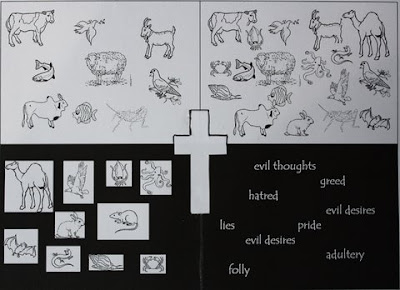
Phew, this one was pretty overwhelming! I found it hard to get my mind around the Leviticus categories of clean and unclean myself, let alone teach it to kids. And when I arrived at Sunday School, I discovered we had 8 extra children!
Aaaargh!
Thankfully, I was already planning to go over what we've learned so far this term:
- that God is holy - which means different from us in every way. He made a special people for himself and rescued them from Egypt. He wanted them to be holy like him, to be set apart for him, to be different from all other nations.

- that God gave his people laws to tell them how to live. These laws showed them how to live as his holy people, different and set apart from all others.

- that God lived among his people in a special way in the tabernacle, God's royal tent palace. That the tabernacle was also holy, set apart as God's dwelling place.

No-one can walk straight into God's house and up to God! Because God is so
holy, because he is so different from us, we would
die if we saw God. And because God is so
perfect, because he never does bad things but we do, we would
die if we walked up to God.
No wonder God was hidden behind a curtain in the
Most Holy Place!
It's been said that Leviticus has
two main themes: "the goal of holiness for Israel and the need for forgiveness".* The rules about
clean and
unclean beautifully illustrated
God's holiness and
our need for forgiveness - that's what they were for!

I explained to the kids that
clean didn't have anything to do with having a shower, and
unclean didn't mean you were muddy and needed a bath.
If you were
clean, it meant you could go into God's holy house, the tabernacle. If you were
unclean, you couldn't go in.
Here’s some things that were clean and unclean (
Lev 11-15):
- some kinds of animals (like sheep and cows) were clean and people could eat them (but not if they died naturally)
- some kinds of animals (like pigs and flies) were unclean and people couldn’t eat them or touch their dead bodies. If a dead fly fell into your bowl and you ate soup from the bowl you were unclean and couldn’t go into the tabernacle!
- some kinds of sicknesses were unclean. If you had spots on your skin, some kinds of spots were clean and others made you unclean. If you had unclean spots, or touched someone with unclean spots, you became unclean and couldn’t go into the tabernacle.
- when people died, the body was unclean. If you touched a dead body, you couldn’t go into the tabernacle.
- some houses were unclean. If the house had mildew (green stuff) growing on its walls, it was unclean. You had to pull down the house.
It was very hard to stay clean all the time! Wherever you went, whatever you did, there were things that could make you unclean.
Every day God's people were reminded of 2 things.
- Every day – every time they were careful about what they ate or touched - it reminded them that God is holy (different), that he chose them to be his holy people, and that he wanted them to live holy lives.
- Every day – every time they touched something unclean and couldn't go to the tabernacle – it reminded them that sin is everywhere, that it kept them from God, and that they couldn’t go near God unless God made them clean again.
Once
Jesus came, everything changed.

Jesus said that
all animals are clean! You can eat whatever you like! (
Mk 7:19)
Instead of people with unclean skin diseases making Jesus unclean,
he made them clean when he touched them! (
Mk 1:40-42)
Jesus said uncleanness doesn't really have anything at all to do with our
bodies - with what we touch or eat.
Uncleanness is about our
hearts. It's about what we are like on the inside. It's about what we
think and
say and
do.
The things that make us unclean are things like being
greedy,
killing people,
stealing things and telling
lies. We do these things because we have
unclean hearts – hearts that want to do bad things. (
Mk 7:1-23)
We have a
big problem, don’t we? The people of God
couldn’t go into the tabernacle when they were unclean. We have unclean hearts - we do bad things - so we can never be friends with God!
We need God to make us clean again.After we'd talked about these things, the kids had a ball making this
poster. They coloured the animals and stuck the clean ones at the top and the unclean ones at the bottom (the quote on the heart is Jesus' words about what makes us unclean from
Mark 7:14-23).

When I asked the kids what makes us unclean now, one boy said "Mud!" and a girl said "Disease". Obviously, they got the point about the Old Testament but not about the New Testament. So if I taught this lesson again, I think I'd make our poster like
this:

On the right hand side, after Jesus comes,
all the animals have moved to the "clean" section. In the "unclean" section are all the things which come
out of our hearts and make us unclean (
Mk 7:14-23).
Here's how the page for our books looked this week:

As you may have guessed, next week's lesson is about sacrifices. Can you guess what colour the page will be?
* William Dumbrell The Faith of Israel 40If you want to see or use my Sunday School lessons, please contact me.


















































